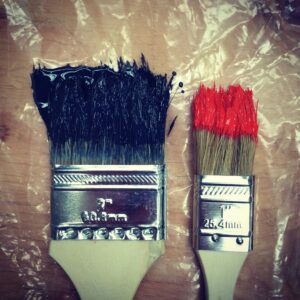
Paint Brush vs. Paint Sprayer: Pros and Cons
Choosing between a paint brush and a paint sprayer can affect the quality, time, and effort needed for your painting project. Here’s a quick look at the pros and cons of each method to help you decide.
Paint Brushes
Pros:
1. Precise and Controlled: Ideal for detailed work on corners, edges, and trims.
2. Affordable and Simple: Inexpensive and requires no special setup or skills.
3. Minimal Equipment: No need for additional tools like compressors.
Cons:
1. Time-Intensive: Slower than sprayers, especially for large surfaces.
2. Uneven Finish: Can leave visible brush strokes.
3. Physically Demanding: Requires more effort on big projects.
Paint Sprayers
Pros:
1. Fast Coverage: Perfect for large walls and ceilings.
2. Smooth Finish: Provides an even, professional look without streaks.
3. Great for Textures: Easily coats stucco, brick, and other rough surfaces.
Cons:
1. Costly Equipment: Higher upfront cost and may require extra tools.
2. Messy: Risk of overspray, needing careful prep and cleanup.
3. Skill Required: Takes practice to master for consistent results.
Which Tool Should You Choose?
Paint Brush: Best for small projects, detailed areas, and budget-friendly tasks.
Paint Sprayer: Ideal for large areas, smooth finishes, and textured surfaces.
Conclusion
Paint brushes offer precision for small or intricate projects, while sprayers save time on large surfaces with a polished finish. Choose based on your project’s size, surface, and budget to achieve the best results.